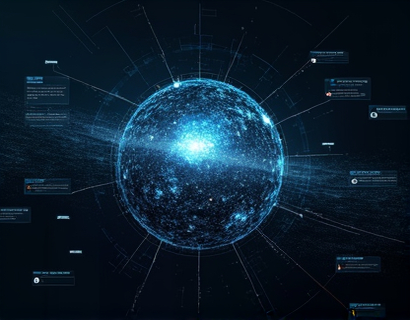Maximizing Multi-Channel Announcements: A Strategic Guide for Businesses and Individuals
In today's fast-paced digital landscape, making impactful announcements across multiple channels is crucial for businesses and individuals aiming to maximize their reach and engagement. This strategic guide provides comprehensive insights and expert strategies to help you effectively publish and amplify your messages across various platforms. Whether you are a business owner looking to enhance your communication strategy or an individual seeking to connect with a broader audience, this guide offers valuable tools and techniques to optimize your multi-channel announcements.
Understanding Multi-Channel Communication
Multi-channel communication involves using multiple platforms and channels to reach your audience. This approach ensures that your message is seen and heard by as many people as possible, increasing the likelihood of engagement and conversion. The key to successful multi-channel communication lies in consistency, clarity, and strategic planning. Each channel serves a unique purpose, and leveraging them effectively can significantly boost your overall communication impact.
Identifying the Right Channels
Before diving into the strategy, it's essential to identify the most suitable channels for your message. Different platforms cater to different audience segments and communication goals. Here are some of the most common channels to consider:
- Social Media: Platforms like Facebook, Twitter, Instagram, and LinkedIn offer vast reach and diverse audience demographics. Each platform has its unique features and user base, making them suitable for different types of content and engagement strategies.
- Email Marketing: Direct email campaigns remain a powerful tool for reaching a targeted audience. They allow for personalized messages and can drive high conversion rates when used effectively.
- Website and Blog: Your official website and blog serve as central hubs for your brand's information and announcements. They provide a professional touch and help in SEO efforts.
- Press Releases: Formal announcements distributed through press release services can reach a wide audience, including media outlets and industry-specific publications.
- Content Marketing: Blog posts, videos, podcasts, and infographics can be used to share detailed information and engage your audience in a more interactive way.
Choosing the right channels depends on your target audience, the nature of your message, and your resources. A well-rounded approach that includes a mix of these channels can help you cover a broader spectrum of potential recipients.
Crafting Compelling Announcements
Once you've identified the right channels, the next step is to craft announcements that capture attention and convey your message effectively. Here are some key elements to consider:
Clarity and Conciseness
Your announcement should be clear and to the point. Avoid jargon and complex language that might confuse your audience. Use simple, straightforward language to ensure your message is easily understood. Keep your sentences short and focused to maintain reader interest.
Value Proposition
Every announcement should highlight the value it brings to the audience. Whether it's a new product feature, an exclusive offer, or important information, clearly communicate how it benefits the reader. This value proposition is what will motivate your audience to engage with your message.
Call to Action
A strong call to action (CTA) is essential for driving the desired response. Your CTA should be clear, compelling, and easy to follow. Whether you want readers to visit your website, sign up for a newsletter, or share the announcement, make the next step obvious and straightforward.
Visual Elements
Incorporating visual elements such as images, videos, and infographics can significantly enhance the appeal and effectiveness of your announcement. Visuals help break up text, make the content more engaging, and can convey complex information quickly. Ensure that any visuals you use are high-quality and relevant to your message.
Streamlining the Announcement Process
To maximize efficiency and consistency, it's crucial to streamline your announcement process. Here are some strategies to help you manage and publish announcements across multiple channels seamlessly:
Centralized Content Management
Use a centralized content management system (CMS) to store and manage all your announcement content. This approach ensures that you have a single source of truth, reducing the risk of inconsistencies and saving time. Popular CMS platforms like WordPress, Drupal, and Joomla offer robust features for content management and scheduling.
Automated Scheduling Tools
Automated scheduling tools can save you a significant amount of time by allowing you to publish announcements in advance. Tools like Hootsuite, Buffer, and Sprout Social enable you to schedule posts across multiple social media platforms from a single interface. This feature is particularly useful for maintaining a consistent posting schedule and reaching your audience at optimal times.
Template Customization
Creating custom templates for different types of announcements can save time and maintain a consistent brand look across all channels. Templates can include pre-defined layouts, color schemes, and CTAs, ensuring that each announcement aligns with your brand identity. Customize these templates for specific campaigns or audiences to add personalization without sacrificing consistency.
Cross-Channel Synchronization
Ensure that your announcements are synchronized across all chosen channels to maintain a cohesive message. This synchronization can be achieved by using a centralized calendar or project management tool like Trello or Asana. These tools help you track the status of each announcement, from creation to publication, and ensure that all channels are updated simultaneously.
Measuring and Optimizing Performance
To truly maximize the impact of your multi-channel announcements, it's essential to measure their performance and make data-driven optimizations. Here's how you can do this:
Analytics and Tracking
Utilize analytics tools provided by each platform to track the performance of your announcements. Key metrics to monitor include engagement rates, click-through rates, and conversion rates. Google Analytics can also provide valuable insights into website traffic and user behavior resulting from your announcements.
A/B Testing
A/B testing involves creating two versions of an announcement and testing them against each other to see which performs better. This method can help you identify the most effective elements of your announcements, such as subject lines, CTAs, and visuals. Use the insights gained from A/B testing to refine your strategy and improve future announcements.
Feedback and Adjustments
Gather feedback from your audience to understand what resonates with them and what doesn't. This feedback can come from direct responses, comments, or social media interactions. Use this information to make informed adjustments to your announcement strategy, ensuring that it continues to meet the needs and preferences of your audience.
Building a Strong Brand Presence
Consistent and effective multi-channel announcements contribute significantly to building a strong brand presence. Here are some tips to enhance your brand's visibility and credibility:
Consistent Branding
Maintain a consistent brand identity across all channels. This includes using the same logo, color scheme, and tone of voice. Consistency helps in building recognition and trust among your audience.
Engagement and Interaction
Engage with your audience by responding to comments, messages, and reviews. Active engagement shows that you value your audience's feedback and are committed to building a relationship. This interaction can also help in addressing any concerns and enhancing your brand's reputation.
Content Collaboration
Collaborate with influencers, partners, and other brands to expand your reach and credibility. Guest posts, joint webinars, and co-branded content can introduce your brand to new audiences and add authority to your announcements.
Conclusion
Maximizing the impact of multi-channel announcements requires a strategic approach that encompasses channel selection, content creation, process optimization, and performance measurement. By following the guidelines outlined in this guide, businesses and individuals can enhance their communication effectiveness and build stronger connections with their audience. Remember, the key to successful multi-channel communication is consistency, clarity, and a deep understanding of your audience's needs and preferences.










































